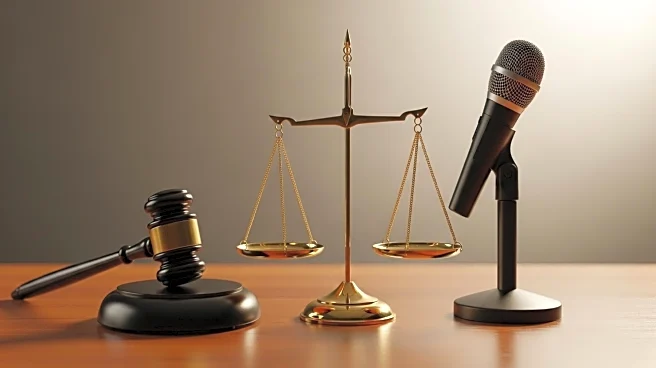What's Happening?
Over 400 actors, musicians, and film directors have signed an open letter organized by the American Civil Liberties Union (ACLU) in response to ABC's indefinite suspension of late-night talk show host Jimmy Kimmel. The suspension followed pressure from the Trump Administration after Kimmel criticized the conservative response to the assassination of activist Charlie Kirk. The letter, signed by prominent figures such as Lin-Manuel Miranda, Pedro Pascal, and Tom Hanks, condemns the government's actions as a threat to freedom of speech. The ACLU's executive director, Anthony D. Romero, likened the situation to a modern McCarthy era, emphasizing the need for collective action to uphold constitutional rights.
Why It's Important?
The suspension of Jimmy Kimmel highlights ongoing tensions between media outlets and government authorities regarding freedom of speech. This incident raises concerns about potential government overreach and censorship, impacting not only entertainers but also journalists and other media professionals. The collective response from the entertainment industry underscores the importance of protecting free speech as a fundamental democratic value. The situation could influence public discourse on media freedom and government accountability, affecting how media companies navigate political pressures.
What's Next?
The controversy surrounding Jimmy Kimmel's suspension may lead to further public and legal challenges against perceived government censorship. The ACLU and other civil rights organizations are likely to continue advocating for media freedom, potentially resulting in increased scrutiny of government actions. Media companies may reassess their policies to safeguard against external pressures, while entertainers and public figures might amplify their voices in defense of free speech. The situation could also prompt legislative discussions on media rights and government influence.
Beyond the Headlines
This incident reflects broader cultural and political dynamics, including the role of media in shaping public opinion and the balance between corporate interests and artistic expression. The entertainment industry's response highlights the intersection of politics and culture, with potential implications for how creative professionals engage with political issues. The situation may also influence public perceptions of media credibility and the role of government in regulating speech.









